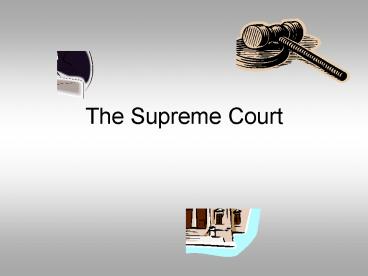The Supreme Court - PowerPoint PPT Presentation
1 / 10
Title:
The Supreme Court
Description:
The Supreme Court Judicial Review: Power to consider the constitutionality of and act of government (legislative, Executive or Judicial) This power rests with the ... – PowerPoint PPT presentation
Number of Views:167
Avg rating:3.0/5.0
Title: The Supreme Court
1
The Supreme Court
2
- Judicial Review Power to consider the
constitutionality of and act of government
(legislative, Executive or Judicial) - This power rests with the Supreme Court
- Final Authority on meaning of the Constitution
3
- Is Judicial review written in Constitution??
- No, it is implied that it should have this power
- What case did the court first assert its power of
Judicial review? - Marbury v. Madison-1803
- Court Packing
- William Marbury
- Thomas Jefferson won election Democratic
Republican (John Adams-lost- Federalist)
Jefferson did not enforce commission of justices
chosen by Adams - Marbury went to Supreme Court with Suit Writ of
Mandamus force delivery of commission - Court refused Marburys request (used Judiciary
Act of 1789) - b/c actions of Govt are inferior to the
Constitution and cannot conflict with it
4
Effects of Marbury v. Madison
- Justice John Marshall claimed the right of the
Supreme Court to declare acts of Congress
unconstitutional - Laid foundation for the Judicial branches key
role in US Govt System - Usually has upheld constitutionality of Federal
and State actions. - Also interprets federal law and its application
5
- Jurisdiction Original and Appellate jurisdiction
- Most cases on appeal
- 2 classes of cases original jurisdiction
- 1. all controversies involving a State(s)
- 2. all cases brought against an Ambassador, or
other public ministers, but not consuls - Court can hear cases involving Consuls if it is
an appellate case.
6
How cases reach the Court
- 8,000 appealed to SC- a few hundred chosen for
review- gt100 actually heard - Most cases come from Highest State Courts and
Federal Court of Appeals - If Justices Agree with LCs decision not chosen
- Rule of Four how cases are chosen
- May remand (return) a case back to LC for
reconsideration - Writ of Certiorari order by S. Court directing
LC to send the record for a given case for its
review (to be made more certain)-issues with the
interpretation of a statute.
7
- Cert- can be granted or denied
- If denied the LC decision stands (4 or ore
justices do not agree SC should accept case) - Certificate cases can reach SC when LC is not
clear about the procedure or the rule of law that
should apply in that case - LC asks SC to certify the answer to a question in
the matter
8
How the SC Operates
- 1st Monday in Oct. June or July
- EX 2002 term ran from Oct. 1, 2002 early
summer 2003 - 1. Accept Case
- 2. Set date
- 3. Hear Oral arguments- for cases for 2 weeks
then recess for 2 weeks to consider - 1000 am (M-W (Th.? ) lawyers are almost always
limited to 30 minutes
9
- Brief Written document filed with Court before
arguments begin. - They are detailed statements that support one
side of a case built on relevant facts and
citation of previous cases - Conference Justices meet they consider the
cases for which they have heard arguments - Chief Justice presides over conference (tells how
he will vote) and each Associate Justice
summarizes their view
10
Opinions
- Majority Opinion Courts Opinion and sets out
the reasoning for which it is based - Precedents majority opinion states precedence or
sets example to be followed in similar cases - Concurring Opinion to add or emphasize a point
that was not made in the majority opinion - Dissenting opinion written by Justices who do
not agree with the majority decision - On rare occasions the SC can reverse itself
- Minority opinion today can be majority opinion
later





![[READ]⚡PDF✔ The Power of Our Supreme Court: How Supreme Court Cases Shape Democracy Kindle Edit PowerPoint PPT Presentation](https://s3.amazonaws.com/images.powershow.com/10065762.th0.jpg?_=20240627024)

























